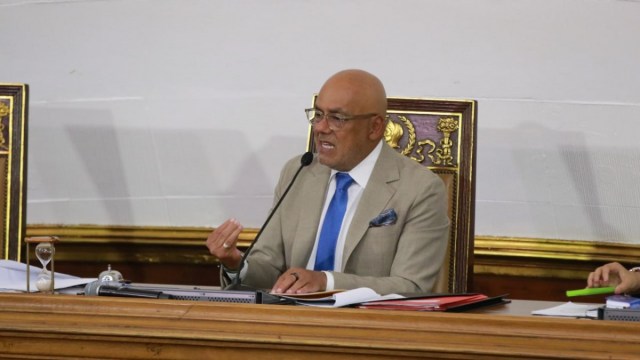
“If the more than 3 billion dollars that was stolen from the people is not returned, the dialogue will not continue,” said Jorge Rodríguez.
By Venezuelanalysis – José Luis Granados Ceja
Jan 18, 2023
National Assembly President Jorge Rodríguez warned that talks between the Venezuelan government and the opposition could face an imminent end as a result of the lack of progress on the release of US $3 billion in Venezuelan funds seized by Washington.
Rodríguez, who heads the government delegation, accused the opposition of not holding its end of the bargain.
“There is no reason to continue to dialogue with people who do not keep their word. If the more than [US] $3 billion dollars that was stolen from the people is not returned, the dialogue will not continue,” said Rodríguez.
In November 2022, delegations representing both the government and opposition traveled to México City to sign a partial agreement, mediated by Norway, focused on social issues following the resumption of the dialogue process after a year-long hiatus.
The deal established a US $3 billion fund to be administered by the United Nations (UN) to address the Venezuelan people’s urgent and various social needs. A statement by the government delegation said the money, drawn from Venezuela accounts illegally seized by the US, would primarily be used to acquire medical equipment as well as vaccines, medicines, as well as strengthening the electric system and repairing school infrastructure.
The deal established a joint commission charged with verifying the correct implementation of the agreement. However, according to Rodríguez, the US-backed opposition has not held up its end of the deal.
“If there is something that I believe in, it is keeping your word, and those men and women who signed the agreement in the presence of the Government of Norway have an ethical and moral obligation to comply with the people,” said Rodríguez.
Stalin González, who is part of the opposition negotiating team, did not respond to Rodríguez’s accusations but said in an interview that accessing the frozen resources “is not easy.”
Following the signing of the government-opposition agreement, the US Treasury Department announced the approval of an expanded license to allow US corporation Chevron to resume pumping and commercializing Venezuelan crude from its four-joint ventures in the Caribbean country.
Since 2017, Washington has imposed financial sanctions against the Venezuelan state oil company PDVSA followed by a full-fledged oil embargo in 2019 and secondary sanctions throughout 2020. The measures have crippled the country’s oil output exacerbating an economic crisis.
The Nicolás Maduro government has repeatedly demanded that Washington remove all economic sanctions imposed by the former Trump administration as part of its “maximum pressure” campaign.
Despite senior White House Latin América adviser Juan González recently calling that strategy “flawed” and “poorly devised”, the Biden government has largely kept its predecessor’s policies in place.
Washington has conditioned any sanctions relief on advances in talks between the government and opposition.
González, senior director for the Western Hemisphere at the National Security Council, nonetheless emphasized on a recent podcast that Chevron’s expanded waiver did not constitute a form of sanctions relief for the government and would not deliver any “immediate” benefit to the Venezuelan government.
“We’re not gonna [sic] lift sanctions unless we see very clear outcomes that level the playing field electorally in the country,” said González.
Venezuelan government officials have regularly expressed frustration after the collapse of previous talks with the opposition, claiming that negotiations are fruitless when it is Washington that is truly calling the shots.
Though US officials have not commented on the fund release delay, foreign policy spokespeople have consistently pushed for early presidential elections that they hope will lead to the ouster of the Maduro government.
González also reiterated the White House’s support for the 2015 National Assembly, despite their term having expired in January 2021.
Several US allies also continue to recognize the 2015-2020 National Assembly as legitimate representatives. The three largest Venezuelan opposition groups voted late last year to eliminate the so-called “interim government”, replacing Juan Guaidó with a three-person council to administer illegally seized Venezuela assets.
Venezuelan Foreign Minister Yvan Gil, who recently replaced Carlos Faría in his post, criticized the UK’s renewed statement of support to the defunct National Assembly.
Gil also condemned the US’ continued sanctions regime after a State Department spokesperson rejected Maduro’s call for the end of the unilateral coercive measures, saying they would remain “intact”.
“One might think that after the recurring failures of the US in its fantasy of overthrowing [Maduro], their arrogance and immorality would be things of the past. The only thing intact today is the will of our people to overcome the aspirations of imperialist vileness,” wrote Gil on Twitter.
…
Read More: Venezuelanalysis – Venezuelan Talks at Risk of Collapse After Gov’t Accuses Opposition of Breaking Pledge
…

